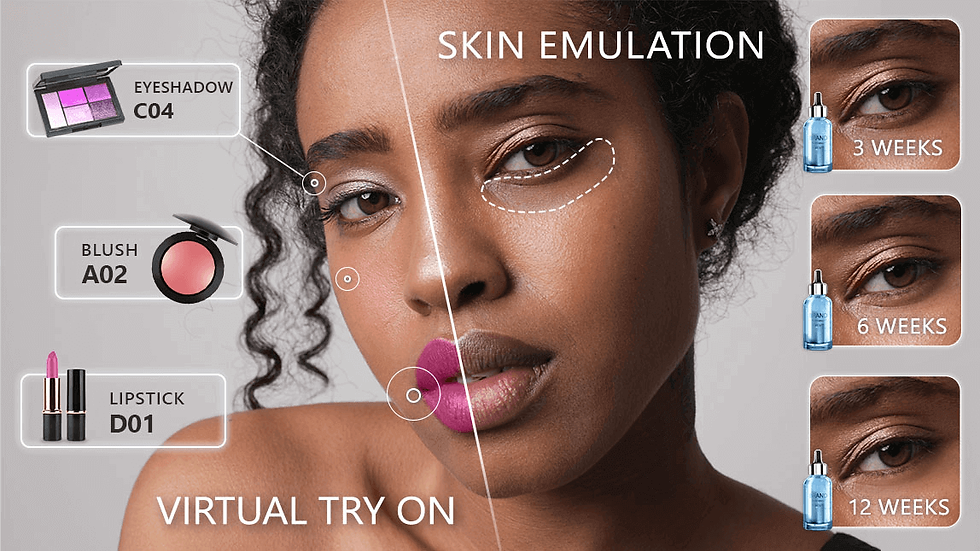The Future of Beauty Marketing: What’s Next?
- ELIZABETH MOREL
- Apr 13
- 4 min read
The beauty industry has come a long way, from old-school magazine ads to viral TikToks and interactive websites. But if you think things have peaked, think again. The future of beauty marketing is already being shaped by mind-blowing tech, eco-conscious consumers, and the fast-moving world of digital trends.
In this final post, we'll explore what’s coming next, and how beauty brands can keep up in a world that’s always changing.
AI is Getting Smarter and Prettier
Artificial Intelligence (AI) isn’t just for sci-fi movies anymore. It’s already helping beauty brands personalize product recommendations, answer customer questions with chatbots, and even create custom skincare formulas.
Some companies are using AI to track trends on social media in real time, so they know what’s going viral before it even fully takes off. Others use it to create digital models and campaigns without hiring a single photographer. Pretty wild, right? As AI becomes more advanced, we’ll see even more personalized and efficient marketing, tailored just for you.
Augmented Reality (AR) is another game-changer. If you’ve ever tried on lipstick using your phone camera or tested eyeshadow with a filter, you’ve already experienced it.
Brands like Sephora and MAC offer virtual try-on tools so you can see what makeup looks like on your face without ever stepping into a store. That’s not just fun; it also makes online shopping way more convenient. In the future, expect AR to become more realistic, more social, and more integrated into apps you already use.

The Rise of Social Commerce
Social media used to just influence purchases. Now, it makes them happen. Platforms like Instagram, TikTok, and even Pinterest are becoming shopping destinations where users can scroll, discover, and buy in just a few taps.
That’s called social commerce, and it’s only going to grow. Beauty brands are already creating videos, influencer posts, and live tutorials that link straight to products. In the future, we might even see fully AI-hosted livestreams selling beauty products in real time.
Beauty with a Purpose: Sustainability is Non-Negotiable
The next generation of consumers cares deeply about the planet. So if brands aren’t talking about their eco-friendly packaging, cruelty-free testing, or sustainable sourcing, they’re falling behind.
Sustainability isn’t a trend, it’s a requirement. Beauty companies will need to be transparent, reduce waste, and prove that their values go beyond the bottom line.
According to Forbes (Erleia, 2024), customer trust depends on honesty, diversity, and environmental care. That means the future is green, and beautifully so.
One of the biggest forces shaping the future of beauty marketing is Gen Z, a generation that’s redefining how brands connect with their audiences. Unlike past generations, Gen Z isn’t just influenced by trends; they help create them. They're digital natives who value authenticity, social impact, and personal expression.
In his TEDx talk, Introducing Gen Z: The New Transformers, Rutgers Professor and marketing expert Mark Beal explains how Gen Z is fundamentally transforming industries, including beauty. They expect brands to be real, responsive, and responsible. That means prioritizing sustainability, diversity, and transparency, not just as buzzwords, but as core values.
For beauty brands, this shift means marketing isn’t just about selling a product, it’s about earning trust and inviting collaboration. The future of beauty will be built alongside its consumers, not just for them.

New Platforms, New Possibilities
TikTok won’t be the last big thing. As tech grows, new platforms will rise, maybe ones built entirely around VR beauty rooms, AI-generated influencers, or immersive product testing.
We might see:
- Virtual “pop-up” shops you can walk through with your avatar
- Beauty tutorials hosted by AI-generated versions of your favorite creators
- Personalized voice assistants giving skincare tips in your bathroom mirror
Beauty marketing used to be one-sided: brands spoke, and we listened. But now, it’s a conversation, and it’s happening everywhere, all the time. People want connection, community, and confidence. They want to feel seen, represented, and heard. The future of beauty marketing will need to reflect that more than ever.
- Virtual reality (VR) beauty tutorials?
- AI influencers that interact with fans like real people?
- Metaverse makeup shops?
- Maybe even personal beauty coaches powered by machine learning?
It might sound futuristic, but all of these are already in the works. The next wave of digital platforms could totally transform how we learn about, shop for, and talk about beauty.

Final Thoughts: The Evolution of Beauty Marketing
From vintage billboards and glossy magazines to YouTube reviews and Instagram filters, beauty marketing has constantly evolved. But through all the changes, one thing has stayed the same: people want to feel good, look great, and be seen. The future of beauty marketing is about technology, yes, but also connection. Brands that succeed will be the ones that blend innovation with authenticity, and trends with truth.
As we wrap up this blog series, remember: beauty isn’t just about products, it’s about people. And thanks to the digital world, those people finally have a voice. Artificial Intelligence is already being used to help beauty brands understand what customers want, before they even ask. AI can track behavior, predict trends, and recommend products based on your skin tone, preferences, and even the weather in your area.
Some skincare brands are even offering AI-generated product formulas tailored to your skin’s needs. Imagine never having to guess which serum works best, you’ll just get the perfect one built for you.
In marketing, AI helps brands write captions, schedule posts, answer questions, and design personalized ad campaigns. That means more relevant content, less spam, and a better experience overall.
The future of beauty is creative. It’s digital. It’s inclusive. And most of all, it’s yours.
References
Erleia. (2024, May 9). Navigating AI in beauty: Transparency, customer focus and Diversity. Forbes. https://www.forbes.com/sites/forbeseq/2024/03/20/navigating-ai-in-beauty-transparency-customer-focus-and-diversity/
Introducing Gen Z: The New Transformers, Mark Beal



Comments